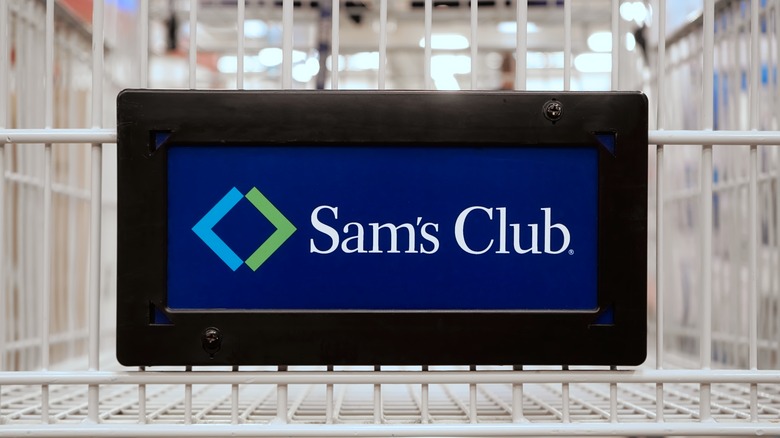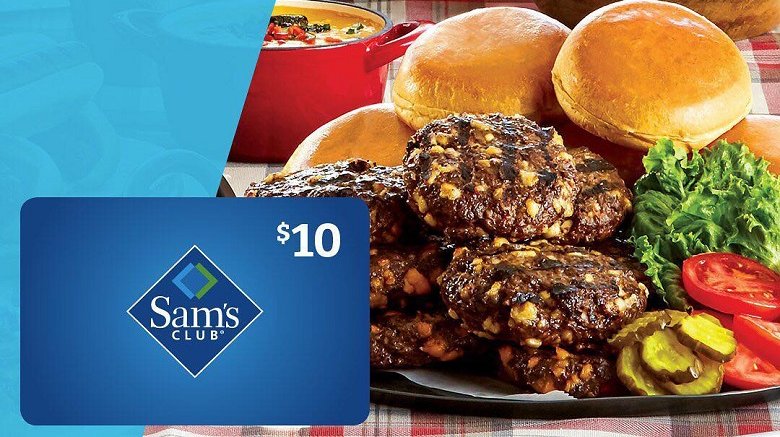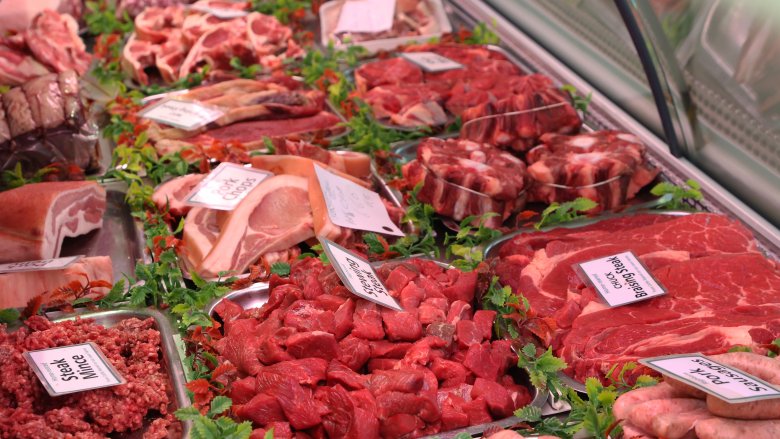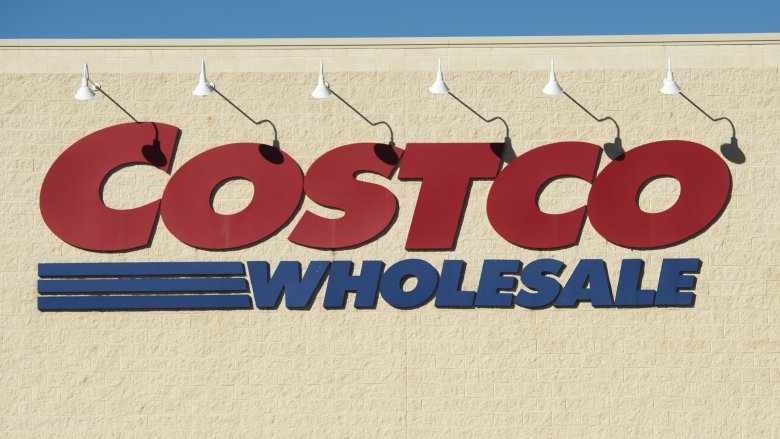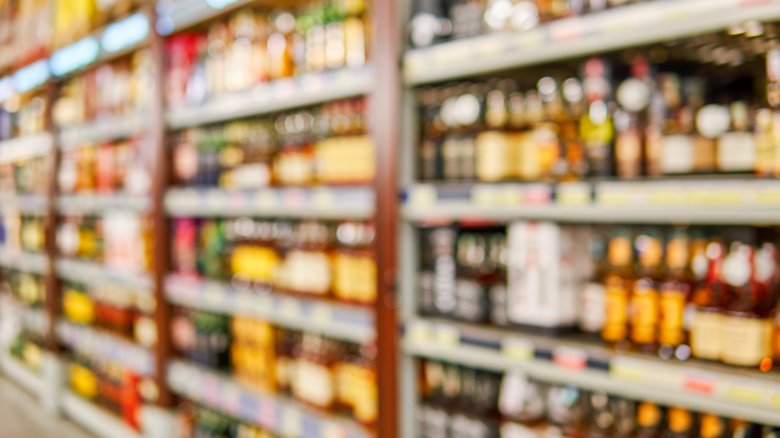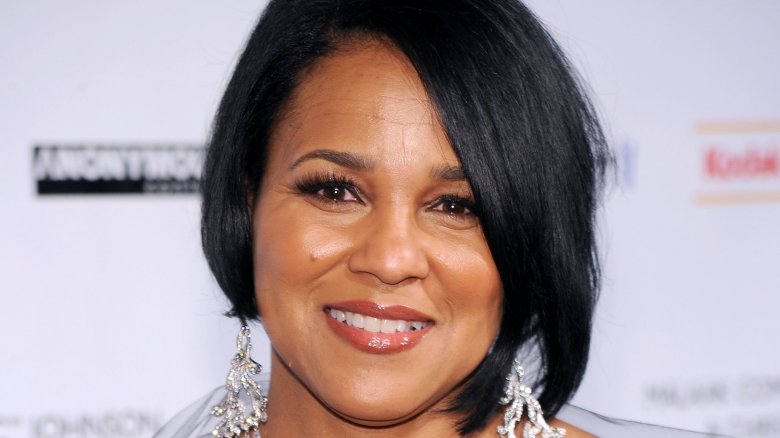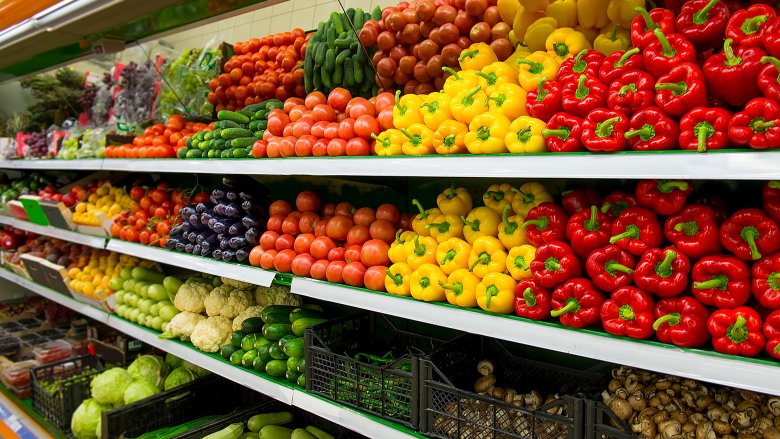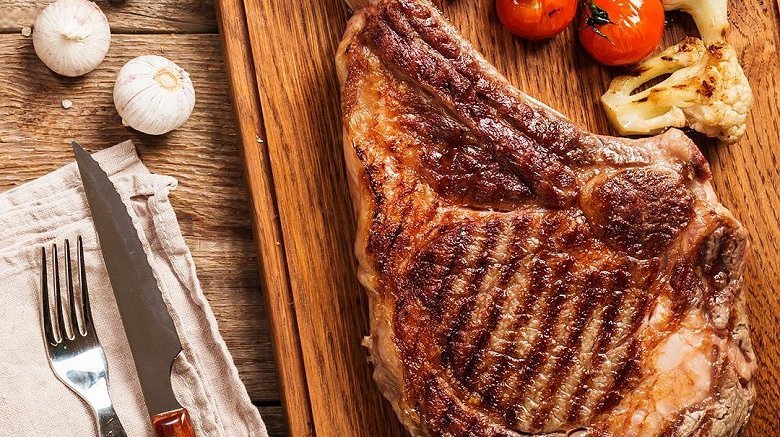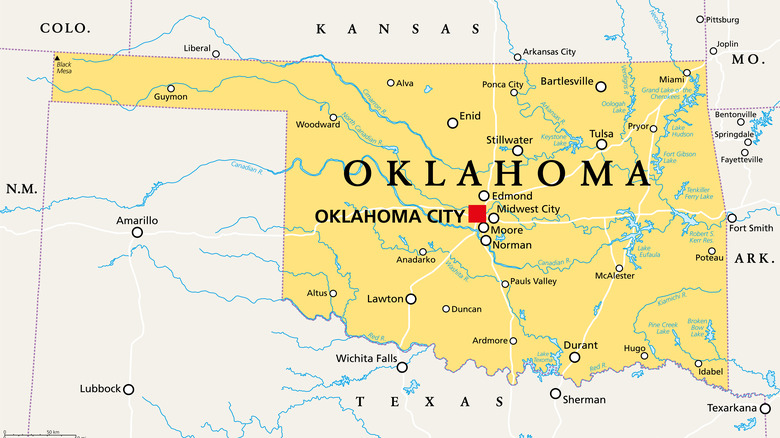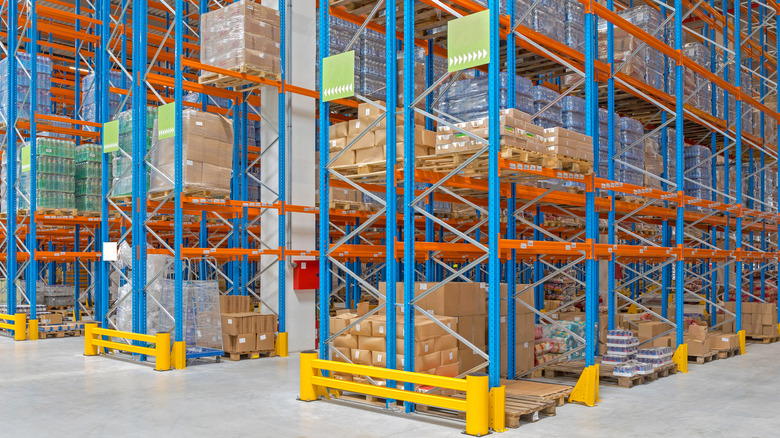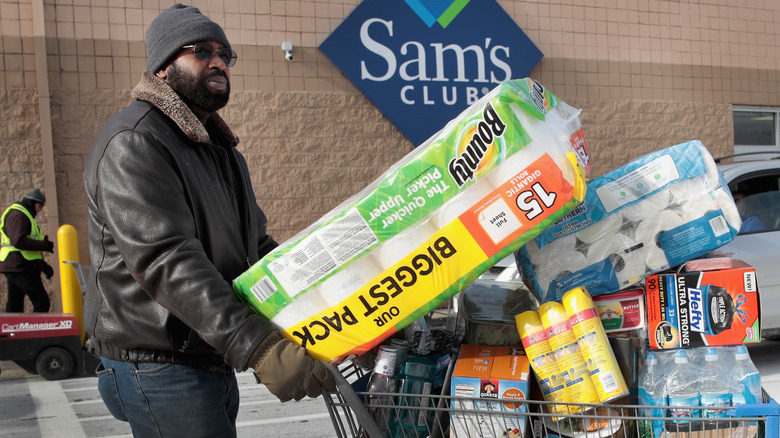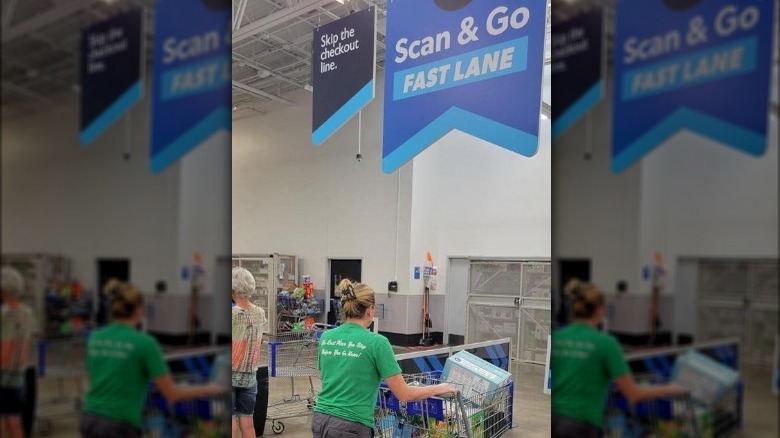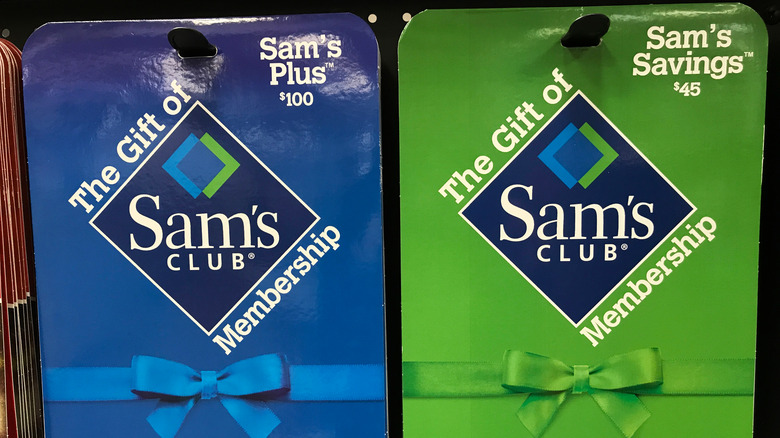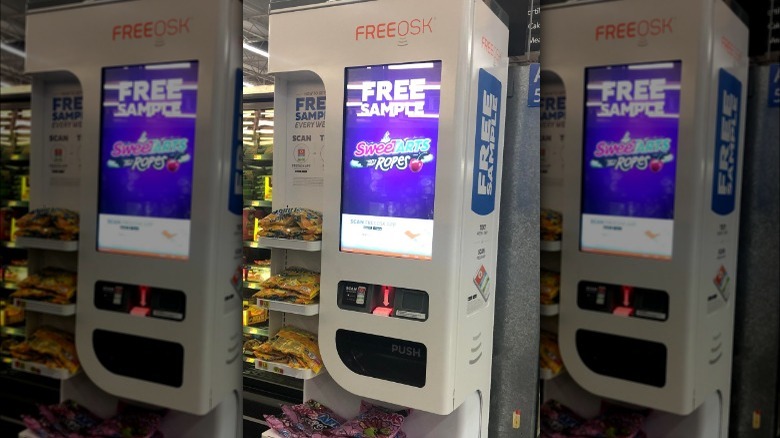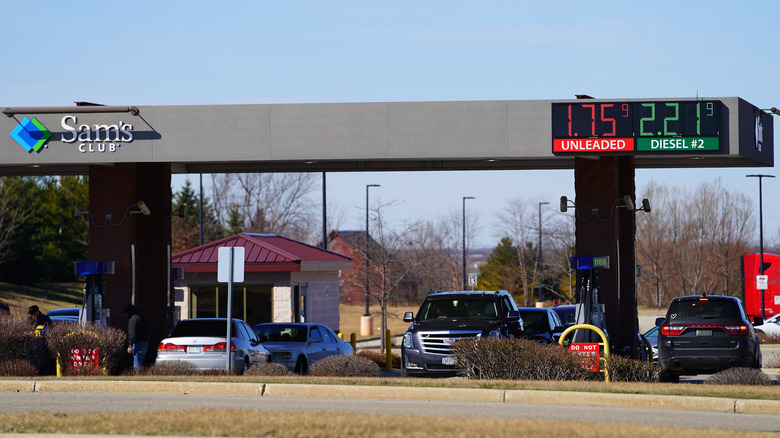Sam's Club: 27 Things To Know About The Beloved Walmart-Owned Wholesale Club
If you're a fan of buying things in bulk, you're probably familiar with Sam's Club. The Walmart-owned store boasts savings for its members and includes some pretty great perks, but is Sam's Club really worth the membership fee? If you're thinking about purchasing a Sam's Club membership, you'll want to know all of the facts. Here are some things you probably don't know about the warehouse store so you can decide for yourself.
1. Whether or not you save is complicated
Whether or not you're actually saving money ... well, it's complicated, so let's start with what Brian Wansink, a professor of consumer behavior at Cornell University, has to say. After you pay that membership fee, you start looking for ways to justify it. There's a weird thing that happens, and it's our tendency to spend more and buy more because we think we're getting a good deal — it's a "justification mentality," he says.
Benjamin Glaser, an editor at DealNews, says stores like Sam's Club aren't shy about tricking customers into spending more than they intend, and they do it by advertising just how much you're saving. Ever gone to Sam's Club for toilet paper and walked out with a new television? You didn't get a good deal on toilet paper, you bought a TV! He also says buying in bulk is a potential pitfall, especially considering an average family wastes around $1,800 a year in groceries. It doesn't matter how good a price is if things spoil before you can use them, but we forget that when we're faced with a good deal.
Shop smart and you can save, though. It's tough for most of us to do, and even though Sam's Club prices are 33% lower than standard supermarket chains (better than Costco or BJ's), there's still a lot of temptation you'll have to navigate through.
2. Not everything is a good buy
If saving money is the reason you're shopping at Sam's Club, you have to be selective about what you buy. Not everything on the shelves is a good deal, and if you want to get the best deal possible on things like everyday cuts of meat and fresh produce, you should know they're usually available at a supermarket for a better price.
Other things you want to stay away from are those in such large quantities you're going to be throwing most of it away. That's stuff like condiments, cereal, and coffee ... unless, of course, you drink enough coffee to go through a 2-pound bag before it goes questionable. That's the rule of thumb for most perishables you can get at Sam's Club, so just remember to shop smart and not get blinded by that amazingly good deal that'll just end up in the garbage.
3. There are secret codes on the price tags
You can never go shopping armed with too much knowledge, and according to Kyle James of Rather-Be-Shopping.com, knowing what all those price tag codes mean is the key to getting a good deal. Sam's Club hasn't confirmed any of this (via ABC News), but it's fascinating food for thought that just might save you some cash.
He says on his blog that a price ending in 1 means it's a sale price and that the letter on the top right of the shelf tag can give you even more valuable info. If it's an A or an N, that means it's something the store always carries and always tries to have in stock. Something with a C means it's a canceled item Sam's is going to get rid of, so you can definitely watch for this one to go on clearance. An S means it's a seasonal item and might only be there for a short time, but it's the O that's hugely important. That means it's a one-time buy, so once it's gone, it's gone. Stock up on this one if you find something you like, because it's not coming back.
4. It don't treat its employees as well as the competition does
Sam's Club has been criticized for the treatment of its employees, especially in comparison to its biggest rival, Costco. Costco not only provides a larger percentage of employees with health insurance but also pays them more money on average.
Costco has cut down on the products it offers in order to keep its workers happy while Sam's Club has cut corners by laying off employees. That's a big difference.
5. It has its own line of wine
Stores releasing their own line of products is nothing new but Sam's Club made a splash with its Member's Mark wine. Generic store brands are usually cheaper than name-brand products, and Sam's Club wine keeps true to that pricing model with a $7 white wine that actually tastes pretty good.
These days, the company has a variety of wines in the Member's Mark lineup, including cabernet, prosecco, and Moscato.
6. You can buy alcohol without a membership
If you want to try out Sam's Club's wines for yourself (or just take advantage of the store's other adult beverage deals) you don't have to dish out for a membership in order to do so. Thanks to laws regulating alcohol sales, Sam's Club's alcohol section is open to the public. Go to your local Sam's Club and tell them you're just there for the booze and you'll be free to enter the store.
7. You can dine in the food court without a membership
Looking for a pizza to go with that six pack you just scored a deal on? After you buy booze from Sam's Club's liquor store you can swing by the food court for a snack. This is another area of the store you don't need a membership to get access to, so you might as well take advantage of it. You should be warned, though. Once you try it you might get hooked. Sam's Club food is surprisingly tasty and reasonably priced.
8. You don't need a membership to use the pharmacy, either
Is your nearest pharmacy inconveniently located inside a Sam's Club? You can still use it, whether or not you're a member of the club. It turns out that this is yet another part of the store that you can go to without having to pay membership fees. There are no extra fees for using the pharmacy without a membership, so you'll be getting the same price as members.
9. The CEO was criticized for promoting diversity
In late 2015, Rosalind Brewer, then the CEO of Sam's Club, caught flak for comments which some thought implied discrimination against white men. Business Insider reported that in an interview Brewer gave to CNN's Poppy Harlow, her dedication to diversity drew criticism.
"Just today we met with a supplier and the entire other side of the table was all Caucasian males," said Brewer. "That was interesting. I decided not to talk about it directly with [the supplier's] folks in the room because there were actually no female, like, levels down. So I'm going to place a call to him."
In spite of the controversy, Walmart stood by Brewer and reaffirmed its commitment to diversity. CEO Doug McMillon said, "For years, we've asked our suppliers to prioritize the talent and diversity of their sales teams calling on our company. Roz was simply trying to reiterate that we believe diverse and inclusive teams make for a stronger business. That's all there is to it and I support that important ideal."
10. The company is against unions
Walmart and Sam's Club are against worker's unions and actively discourage employees from forming them. Leaked training materials show the tactics the company uses to squash any thoughts of unionizing. When the meat department at a Texas Walmart unionized in 2000, Walmart eliminated butchers from nearly 200 stores.
"People are scared to vote for a union because they're scared their store will be closed," Barbara Getz, a Walmart employee, told The Atlantic.
11. There used to be a Más Club
One Houston-based store was the only Más Club location ever built. Set up much like other Sam's Club stores, Más Club's main difference was that it carried more Latin American merchandise for its members. The Más Club opened in 2009 as a test before the company realized the community would be better served by simply expanding product offerings in its traditional Sam's Club locations. The store announced its closing in 2014 after four years in business.
12. Members have a lot of access to perks
There are a lot of perks available to Sam's Club members. Small business owners can purchase insurance through Sam's Club for their employees, a service that was extended to individuals in 2016. The store also provide packages which provide assistance with payroll services and legal solutions.
Members can also get help with their taxes through Sam's Club and are guaranteed the maximum refund possible. Accounting services are available for both individuals and small businesses.
13. Sam's Club targets higher-income customers
If you've noticed a difference in the food options you're seeing at Sam's Club, you're not imagining it. In 2016, Sam's Club went after Costco by taking aim at another portion of the market: higher-income customers who generally headed to the competition.
According to Fortune, the brand did this by starting to carry trendier foods, installing teams of regional buyers to select local, gourmet, organic, and natural foods, and opening more stores in more affluent areas.
14. It revamped and consolidated its private food brand
Member's Mark is Sam's Club's own private brand, and in 2016 the entire line got a complete makeover. According to Food Business News, it was no small endeavor that saw all 21 separate, previously-existing private brands revamped into Member's Mark products in an attempt to standardize the line. Included in the overhaul were 300 new products hitting the shelves in 2017, around 600 slated for revamping in 2018, and a plan to continue adding around 300 new items to the brand every year going forward.
The official Sam's Club press release told of the lengths the team went to, sourcing ingredients from all over the world and from some of the industry's top performers stateside. There are regional favorites — like Member's Mark All Natural Pulled Pork, made with guidance from the Kansas City Barbecue Society — and other tasty goodies like handcrafted caramels, fair trade certified K-Cups, and honey sourced from a beekeeping co-op.
15. The Sensory Lab decides what goes on the shelves
Not everything makes it through the rigorous testing program Sam's Club uses to decide what's going on the shelves, and The Recipe Girl got a firsthand look at the Sensory Lab in Bentonville, Arkansas. When Lori Lange toured the facility, she says she was most impressed by the 9-point scale all food products are rated on. Anything that gets less than a 7 doesn't make it onto the shelves, and distributors are allowed to make adjustments to their product based on feedback and resubmit for testing.
According to 5 News Online, the Sensory Lab panel is made up of anywhere from 65 to 100 people who sample and rate four different foods every day. They're rated on things like taste and texture, and in 2012 they evaluated nearly 1,700 items. That includes regional favorites for Sam's Club locations across the country, and Vice President of Communications David Tovar says only about 15% of foods tested make the cut.
16. Sam's Club has a connection to Duck Dynasty
Sam's Club made its first acquisitions in 1987, purchasing 24 SuperSaver Wholesale Warehouse Club stores in Louisiana (via the Cleveland Banner). Prior to the shift to Sam's Club, those stores were owned by father-and-son business partners Alton and John Howard. If you're familiar with the reality show "Duck Dynasty," you know John's daughter, Korie.
Only a year prior to selling to Sam's Club, John Howard talked to NewsOK about how much better his stores were. He cited things like higher ceilings, wider aisles, uniformity across all stores, and the need for store members to meet hand-picked criteria to belong to the club.
17. The first Sam's Club opened in a really random location
Despite Bentonville, Arkansas, being the home of everything related to Walmart and Sam's Club, the first Sam's Club didn't open in Arkansas. Even if you're from Oklahoma, you've likely never been to the location where Sam Walton opened his first wholesale club in 1983 — a small suburb of Oklahoma City called Midwest City. The city is 220 miles southwest of Walmart's Bentonville, Arkansas, headquarters.
The idea behind Sam's Wholesale Club (as it was called then) was to provide large quantities of goods for small businesses. So it was the perfect place for restaurants to get huge numbers of items like napkins and plastic utensils or business entrepreneurs to stock up on paper and file folders.
The decision to open Sam's Wholesale Club in 1983 came 21 years after Walmart debuted and five years before the first Walmart Supercenter opened. Since the Sam's Club concept seemed to work in Midwest City, Walton opened up two more stores that year, bringing in $40 million. Within two years, Sam's Wholesale Club had even more locations and raked in $225 million in sales.
18. Some Sam's Club locations were turned into fulfillment centers
We first started to see a large number of Sam's Clubs disappearing in 2018. One reason was that e-commerce had become a bigger part of the business model for Walmart and Sam's Club, so it became necessary to accommodate those changes. In 2018, Walmart decided the best course of action was to close 63 Sam's Clubs and turn 12 of them into fulfillment centers for online sales.
An email CEO John Furner sent to employees said that an internal study had revealed that the company "had built clubs in some locations that impacted other clubs, and where population had not grown as anticipated" (via Business Insider). Thus, it was those clubs the company put on the chopping block for conversion.
The move made sense since, as of 2018, online orders had already started to represent around 10% of most companies' sales. As a result of ever-increasing online sales, the initial 12 Sam's Club fulfillment centers had grown to 55 high-automation order fulfillment warehouses by 2023 (via The Wall Street Journal).
19. Chinese customers boycotted Sam's Club
China has long been criticized for its treatment of non-Han minorities in China. Among these are the Uyghurs, a largely-Muslim minority group living in the northwest region of Xinjiang. Accusations made against China in connection to the Uyghurs range from forced labor and re-education camps to sterilization and full-scale genocide. Xinjiang's resources and strategically-located borders make it an extremely important region for China. The world gets 20% of its cotton from Xinjiang as well as a great deal of oil and gas. In 2020, evidence emerged indicating that at least 500,000 Uyghurs were being enslaved and forced to pick cotton by hand as a part of their "re-education" (via BBC).
When companies like Sam's Club and Walmart realized their Xinjiang-made goods were possibly made with slave labor, they decided to discontinue ordering anything from Xinjiang. China called Sam's Club's decision a mistake and threatened retribution.
Per CNN, by the end of 2021, President Joe Biden signed into law a complete ban on Xinjiang imports. While China has generally ignored genocidal allegations in the past, not being able to export Xinjiang goods, first to Sam's Club and Walmart, and then to all of the U.S., represented a huge financial hit. Since Sam's Club removed items made in Xinjiang from its stores, there have been many Chinese-government-led social media criticisms and citizen boycotts of Sam's Clubs. As a result, many people in China have canceled their Sam's Club memberships.
20. Non-members can get a one-day pass
If you live alone or have a small family and go out to eat a lot, you might find that bulk buying doesn't really work for you. Anyone can enter a Sam's Club and walk around to see what's available without a membership card. However, just looking around may not give you a real idea of whether you can consume large quantities of bulk goods before they go bad.
Luckily, if you find yourself wondering if Sam's Club membership is for you, there's a way to test drive Sam's Club membership for a day. Unfortunately, you will pay an extra 10% on all your purchases like non-members do when they shop online.
If you're test-driving a membership for the day, you may want to check on the membership fee before you go shopping, especially if you plan to buy a lot. Club membership is usually $50, but there are occasionally deals for half-off membership fees. So, if your membership fee would only be $25 and you're purchasing over $250 worth of groceries and goods with a 10% markup, it would make sense to go ahead and get the membership, even if you don't use it again.
21. There are a few ways shoppers can lose their memberships
Unlike Walmart, Sam's is a club, and it's a privilege to be able to shop there. Even if they've paid your membership fee for the year, there are ways customers can lose their memberships. Most involve fraudulent behavior or disruptive and threatening actions toward customers or employees. Additionally, Sam's Club says it "reserves the right to accept, refuse, or revoke Membership with or without cause at any time at its sole discretion."
There are three types of theft that can result in people losing their memberships. People who write a check and don't have money in the bank to cover it can kiss their memberships goodbye. Anyone who shoplifts can expect to be escorted out without a chance of returning to the store. Further, anyone who tries to return something that doesn't seem to be a legitimate return won't be allowed to be a member anymore.
Bad behavior will also get a customer kicked out and their membership revoked. This bad behavior includes acting violent in general or being extremely rude toward employees. Actions toward employees that can result in membership revocation range from cussing out the employee to acting in an abusive or threatening way.
22. It's possible to use your phone to skip the checkout line
One technology-forward option at Sam's Club is that you can use the Scan and Go app to pay for your purchases without having to go through the checkout line. You simply use the app as a scanner as you put items into your cart. When you're done, the app will ask you to confirm that you have the same number of items in your cart as you scanned. Once you confirm the number, you can swipe the app to pay.
Then, when it's time to leave the store, you can bypass all the registers. You'll find a Scan and Go Fast Lane that you can use to pass through to the exit. The words "Scan and Go Fast Lane" and arrows are projected on the floor in this lane. However, we'll let you in on a little secret we've discovered. If you look upward, you'll realize that there's no magical machine above the lane checking to make sure you've paid — just a projector for the dynamic floor sign. So, you technically don't have to walk through the designated Fast Lane to leave. When you reach the associate at the exit, they will quickly scan the QR Code on your Scan and Go app to prove you've paid, and you can then make your way to the parking lot.
23. Plus members get more club perks
Regular Club yearly membership costs $50. However, for just $60 more ($110), Plus membership provides you extra membership perks. One of the biggest advantages to Plus membership is free shipping for online and app orders. And curbside pickup is free instead of $4 like it is for other Sam's Club members. If you use either of these services, it won't take long for the Plus membership to pay for itself.
Something else you won't get with regular membership that is available with Plus membership is only paying $4 for a 30-day supply of some generic medicines. Sam's Club says this discount usually represents a savings of 65%-$80% on the normal price. If your Sam's Club has an optical center, you can also use your Plus membership to get any eyeglasses that you purchase for 20% less than the listed price. Plus, if you order contacts through the optical center, you won't have to pay to have the contacts shipped to your home.
There are also a couple of cash-back options for Plus members. At the end of each month, Plus members will find a refund of 2% on their membership card, which they can turn around and use at Sam's Club or redeem for cash (up to $500 yearly). Plus members who use the Sam's Club Mastercard for purchases at Sam's Club get an additional 3% cash back (compared to 1% for regular members).
24. Walmart and Sam's Club gift cards are interchangeable
Sam's Club offers a variety of gift cards, including Walmart and Sam's Club gift cards. The beauty of buying either of these cards is that they're interchangeable. You can use your Walmart gift card at Sam's Club and your Sam's Club gift card at Walmart. Not only can you use both types of gift cards within the store itself, but you can use them to buy gas in both places.
There are situations, however, where you cannot use your gift card. You won't be able to use either type of gift card to pay your Sam's membership fee. If you want to gift someone with a membership, you should give them a Gift of Membership card instead. You also won't be able to use your gift card to make Sam's Club or Walmart purchases online if it doesn't have a personal identification number (PIN) code.
25. If there's nobody giving out samples, you can still usually get some from the Freeosk machine
One of the great pleasures of visiting Sam's Club, especially on the weekend, is getting to try food and drink samples. Usually, an employee will have a little station set up to dole out small portions of the club's foods and drinks for customers to try. Just be careful all those samples don't lead to an extra $100 in purchases you didn't plan to make before you get out the door.
However, if you visit during a non-peak time when Sam's doesn't think it's profitable enough to give out samples, you may still be able to get one from a Freeosk machine. No, Freeosk machines aren't going to be cooking up Lit'l Smokies in an internal crockpot, but you might still get to try something interesting. Since the samples are coming from a machine they come fully packaged. You might end up getting to sample something like a full-sized Mr. Clean Magic Eraser or a Member's Mark Better Nut Bar that you can take home to try out at your convenience.
26. There's a reason there's always a line at Sam's gas pumps
Nearly every time you visit Sam's Club (especially on the weekends), you'll see a line of cars waiting to fill up their tanks at the Sam's Club gas pump. And there's a good reason people flock to Sam's Club for gas. For people with a Sam's Club membership, the place with the cheapest gas is often Sam's Club.
The discount that members get for buying their gas at Sam's Club is $0.05 per gallon. $0.05 per gallon may not sound like big savings if Sam's Club is out of your way. But timing your fill-ups with your Sam's Club visits can save you a significant amount over the course of a year. For example, if you fill up a 40-gallon SUV tank once a week, you will save $2 per week and $104 per year buying your gas from Sam's Club.
Further, if you use a Sam's Club Mastercard to buy gas, you'll end up getting 5% back on gas. So, when you fill up a 40-gallon SUV tank with gas that's regularly $3.55 per gallon, you save $2 because you're a member and get $7 cash back for using your Sam's Club Mastercard. That's definitely not a bad deal if you're paying off the credit card monthly.
27. Sam's Club's founding family, the Waltons, are the richest family in the U.S.
All the money from Walmart, Sam's Club, and Arvest Bank makes the Walton family the richest family in the U.S. Sam Walton's brother, three children, daughter-in-law, grandson, and two nieces have access to a combined total of $247 billion. Of course, some of the wealth ends up going toward extravagant purchases like Walton's son Rob buying the Denver Broncos for $4.65 billion and Alice Walton building the Crystal Bridges Museum in Bentonville to showcase her half-a-billion-dollar art collection. However, there's also a philanthropic side to the family.
Anyone who lives near the Sam's Club headquarters in Bentonville, Arkansas, will see the Walton name connected to various philanthropic endeavors through The Walton Family Foundation, which Walton and his wife Helen founded. It focuses on K-12 education and programs related to river and ocean environmental health. Of course, it also supports various initiatives for the people of the Northwest Arkansas area around Bentonville as well as other areas of Arkansas. Under the supervision of Lukas Walton, the foundation has started to invest 90% of its money in Environmental, Social, and Governance (ESG) endeavors, which means investing in companies that, in Walton's words "prioritize sustainable and equitable solutions (via The Observer).
